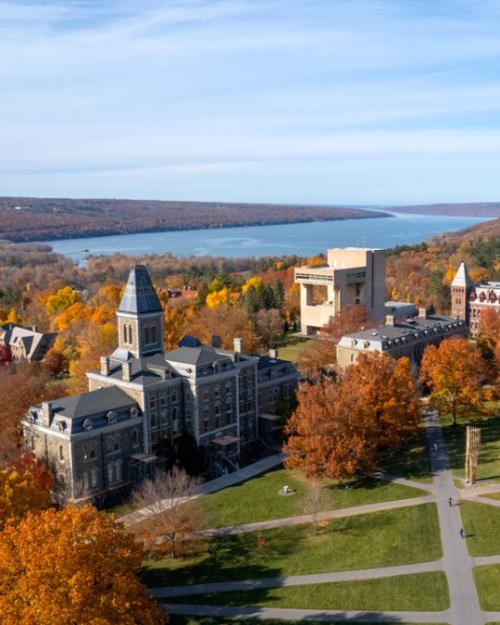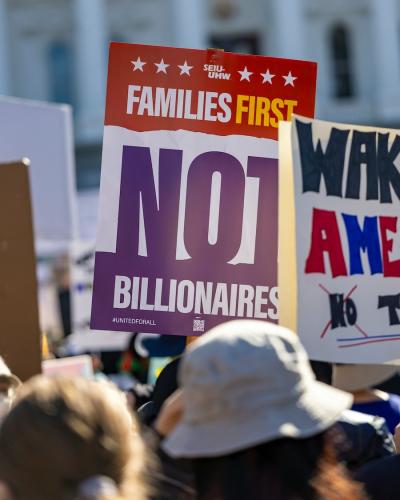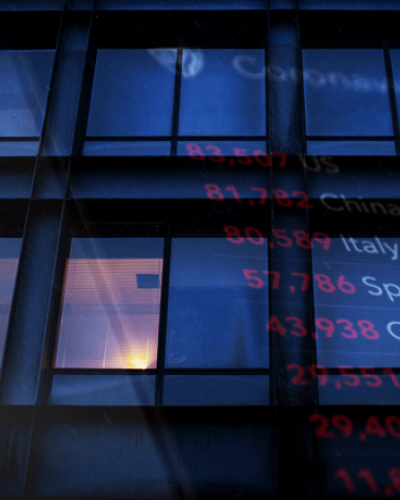The COVID-19 pandemic has already had enormous impact on individual and family life and livelihoods, on social interactions, on social cohesion and conflict, and on most major social and political institutions. Many of sociology’s faculty and graduate students are applying their expertise in social processes to understand some of the consequences of the pandemic and, in the process, help inform policy efforts to mitigate its spread and its deleterious effects.
Is COVID-19 a Threat to Democracy?
Mabel Berezin, Sociology; Kenneth Roberts, Government
We know that COVID-19 has broad impact on economic and social life, but what are its effects on democratic practices? In the United States, the pandemic is likely to affect the 2020 Presidential election by highlighting the political and ideological differences between the parties and by affecting how many and which citizens vote. In Europe, the epidemic seems to be giving new energy to right-wing parties and affecting EU governance. This project will bring together faculty from sociology, government, and other disciplines.
See www.mabelberezin.com for related research.
How has COVID-19 Affected the Daily Mobility Patterns and Health Outcomes of Urban Older Adults?
Erin York Cornwell, Sociology; Kate Cagney, Sociology (Chicago); Christopher Browning, Sociology (Ohio State University).
Are older adults who are racial and ethnic minorities, from lower SES households, or living in disadvantaged neighborhoods less able to comply with social distancing recommendations? If so, do they suffer higher rates of infection and experience worse emotional and physical health outcomes? To answer these questions, this project will collect three waves of geotagged, smartphone-based data on 450 older adults from 10 racially and economically diverse neighborhoods during the pandemic, and link these data to earlier waves of data collected on the same respondents but before the pandemic.
This study is funded by an NSF Rapid Response grant.
What is the Impact of COVID-19 on Immigrant Populations?
Filiz Garip, Sociology; Shannon Gleeson, Industrial and Labor Relations and Sociology by Courtesy; and Matthew Hall, Policy Analysis and Management and Sociology by Courtesy.
This project assesses the social and economic impact of the COVID-19 outbreak on new immigrants in the New York metropolitan area. To reach this population, the project will use an innovative method called network sampling with memory to collect information on immigrants’ work histories, experiences with COVID-19, and potential coping mechanisms. The project will inform policy efforts to alleviate the negative effects of the outbreak on a particularly vulnerable population living in one of the epicenters of the pandemic.
Engineering Your Judiciary: COVID-19 and Judicial Appointments
Radu Andrei Pârvulescu, Graduate Student in Sociology, Cornell
How do plagues and economic instability affect the appointment of judges and prosecutors and, indirectly, state justice? This project studies how societal crises, including but not limited to pandemics, can change legal systems by giving political elites leverage to shape laws in their interests. It uses historical employment data of Romanian magistrates with agent-based models of occupational mobility to study how crisis shocks (e.g. a sudden wave of retirements) affect the judiciary.
An op-ed on the topic is here: https://discoversociety.org/2020/04/24/engineering-your-judiciary-or-how-the-covid-crisis-wont-go-to-waste/. Additional research materials are here: https://osf.io/rv94y/
Toward a New Sociology of Testing for the COVID-19 Era
Trevor Pinch, Science & Technology Studies and Sociology by Courtesy; Janet Vertesi, Sociology (Princeton; Cornell PhD in STS)
In the absence of a vaccine, testing is one of the main tools for managing COVID-19. However, testing is itself the result of a complex set of social processes and decisions: who gets tested? How? Where? Why do some testing technologies get adopted, while others do not? This project uses examples from the current COVID-19 pandemic to show the underlying epistemological and entwined societal issues that undergird the current testing crisis and, in the process, outline a new sociology of testing,
The Small World Network of College Classes: Implications for Epidemic Spread on a University Campus
Kim Weeden, Sociology and Benjamin Cornwell, Sociology
This project uses transcript data from Cornell to map the structure of enrollment networks that connect students through their courses and, in the process, create the social conditions for epidemic spread of infectious disease. It describes the structure of this “small world” network and shows how connectivity changes when some course are moved on line. It will also assess how the timing and duration of courses affects the network, estimate the risk of infection through these networks, and look at differences in risk by student’s level in school, major, gender, race, and socioeconomic status.
A short summary of the results is available here. The first paper off the project has been recently published in Sociological Science.
How can the social and behavioral sciences inform the COVID-19 pandemic response?
Van Bavel, Jay (Psychology and Neural Science, NYU), Robb Willer (Sociology, Stanford; Cornell PhD), and 40 other authors including Kim Weeden, Sociology.
The COVID-19 epidemic requires large-scale behavioral change and places significant burdens on individuals, families, and other social institutions. This paper discusses research from social and behavioral science that is relevant to pandemics, including work on navigating threats, social and cultural influences on behavior, science communication, moral decision-making, leadership, and stress and coping. It also discusses uncertainty in this prior research, and highlights gaps that should be filled to help devise more effective public health responses to COVID-19.
This paper was recently published in Nature Human Behaviour: Using social and behavioral science to support COVID-19 pandemic response. Professor Weeden co-wrote the section on economic and racial inequality.
Networked infections: Does contracting COVID-19 with loved ones affect illness severity?
Xuewen Yan and Tianyao Qu, Graduate Students in Sociology
We know that intra-familial connections channel COVID-19 transmission, but do they also directly affect the infection’s severity? This project analyzes complete, administrative data of 417 Shenzhen COVID-19 patients, using network visualization and survival modeling. Initial results show that while patients with infected family members have significantly longer hospital stays, their overall illness durations are only slightly extended, due to the compensating effect of reduced time to diagnosis. These results highlight the necessity of early identification in mitigating the extra damage caused by the diagnosis of loved ones.
Data used in this project is publicly available through the Shenzhen city government data portal: https://opendata.sz.gov.cn/. Additional research materials are available here: https://osf.io/5epc4/.





